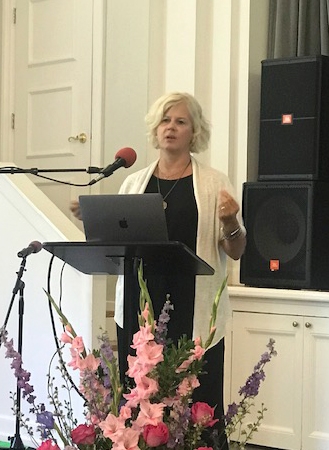
FAYETTEVILLE, Ark. – Kelly Way, associate professor of hospitality management, is teaching an honors forum this fall on opioids, and recently listened to a discussion and met the author of a book being used in the course.
Way, who is assistant director of the School of Human Environmental Sciences in U of A's Dale Bumpers College of Agricultural, Food and Life Sciences, is teaching The Opioid Epidemic: Insights and Potential Solutions course.
The class takes an in-depth look at the development and impact of the opioid crisis across the country. In 2017, more than 72,000 people died from overdoses involving opioids, and 40 percent of all opioid overdose deaths involved a prescription opioid. On average, 115 Americans die every day from an opioid overdose. Drug overdose is now the leading cause of accidental death in the U.S., and opioid addiction is driving this epidemic.
Way draws in information from Dopesick, a book written by Beth Macy, which recounts the opioid epidemic in America. A New York Times bestseller, it is the only book to fully chart the devastating opioid crisis by a bestselling author and journalist who lived through it.
"This is a masterful work by Beth Macy that takes the reader to the epicenter of America's 20-plus-year struggle with opioid addiction," said Way. "Macy charts the opioid crisis in America with unforgettable portraits of families and first responders on the front lines. We begin to see that the only thing that unites Americans across geographic and class lines is opioid drug abuse. Many of our forum discussions are provoked by topics in this book as well as validated by the information Macy provides in her book. These are real stories from real people, many the same age as students in the honors forum. The book is highly relatable."
Macy discussed her book and experiences in August at All Souls Unitarian Church in Tulsa, Oklahoma, an event sponsored by Booksmart Tulsa and All Souls Criminal Justice Outreach.
"I met Beth and had her autograph my copy of Dopesick, and told her about the class and she was thrilled," said Way. "I told her about my NIFA grant to research opioids and tourism workers, and she was thrilled about that, too. She noticed that of all the people in the crowd, I was the only person taking notes — she commented on that and said 'I knew you were here for another reason other than the discussion, it was great to see you out there.'"
Way listened to the presentation as well as a panel discussion with representatives from the Oklahoma State University Medical Center, which included emergency department physicians and public health specialists.
"It was such a thrill to meet Beth Macy in person and listen to the stories about people and communities, their struggles and heartbreak along the way as she wrote this book," Way said. "I was kind of a fan-girl while Beth signed my book, but after telling her about what we are doing at the U of A regarding opioids education and research, it was obvious we are all working toward the same goal - helping America overcome this epidemic and bring a new understanding of addiction to society that includes compassion and treatment."
Way's interprofessional course challenges preconceptions about addiction and who can become addicted to opioids. It reviews the pharmacology of opioids; includes discussion on alternatives to opioids for pain management; considers how the epidemic affects the community and the workplace; and reviews recent legislative updates.
"It's faculty members like Kelly Way who inspire all of us to improve our world, particularly its next generation of leaders," Betsy Garrison, director of HESC, said.
Way's primary research interests include opioid abuse in the business sector, consumer behavior, tourism, festivals, marketing and branding. Her research has appeared in the Journal of Culinary Science & Technology, the Journal of Hospitality Marketing and Management, The International Journal of Hospitality Management and many others.
About the Dale Bumpers College of Agricultural, Food and Life Sciences: Bumpers College provides life-changing opportunities to position and prepare graduates who will be leaders in the businesses associated with foods, family, the environment, agriculture, sustainability and human quality of life; and who will be first-choice candidates of employers looking for leaders, innovators, policy makers and entrepreneurs. The college is named for Dale Bumpers, former Arkansas governor and longtime U.S. senator who made the state prominent in national and international agriculture. For more information about Bumpers College, visit our website, and follow us on Twitter at @BumpersCollege and Instagram at BumpersCollege.
About the University of Arkansas: The University of Arkansas provides an internationally competitive education for undergraduate and graduate students in more than 200 academic programs. The university contributes new knowledge, economic development, basic and applied research, and creative activity while also providing service to academic and professional disciplines. The Carnegie Foundation classifies the University of Arkansas among only 2.7 percent of universities in America that have the highest level of research activity. U.S. News & World Report ranks the University of Arkansas among its top American public research universities. Founded in 1871, the University of Arkansas comprises 10 colleges and schools and maintains a low student-to-faculty ratio that promotes personal attention and close mentoring.
Topics
Contacts
Robby Edwards, director of communications
Dale Bumpers College of Agricultural, Food and Life Sciences
479-575-4625,